An Phoblacht, Vol. 1, No. 5
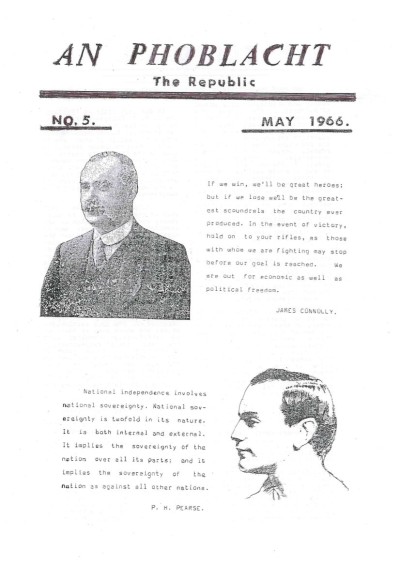
| Date: | 1966 |
|---|---|
| Organisation: | Irish Revolutionary Forces |
| Publication: | An Phoblacht [IRF] |
| Issue: | Volume 1, Number 5 May 1966 |
| Collection: | 1916 Easter Rising: Anniversaries and Commemorations |
| Type: | Publication Issue |
| View: | View Document |
| Discuss: | Comments on this document |
| Subjects: |
Please note: The Irish Left Archive is provided as a non-commercial historical resource, open to all, and has reproduced this document as an accessible digital reference. Copyright remains with its original authors. If used on other sites, we would appreciate a link back and reference to The Irish Left Archive, in addition to the original creators. For re-publication, commercial, or other uses, please contact the original owners. If documents provided to The Irish Left Archive have been created for or added to other online archives, please inform us so sources can be credited.
Commentary From The Cedar Lounge Revolution
30th September 2013
Please note: Issues 5 and 6 of An Phoblacht were added to the Irish Left Archive on the Cedar Lounge Revolution together, with the following commentary.
As noted before, it is intended to bring the full run of An Phoblacht’s from the IRF over the next few years with editions being posted up on a regular basis. My thanks as always to Jim Lane for providing the Archive with these documents.
These editions are an very useful addition to the documents already posted up from this source in the last few months. As before in order to give a sense of their content a limited selection of quotes from the editorials will suffice.
The editorial in No. 5 notes that:
The 50th Anniversary of the Easter Rising has occasioned much humbug and an immeasurable amount of hypocrisy. The people have been treated to a vast and colourful circus. And yet, desire the outward show of self-assurance and downright arrogance on the part of its promoters, the did not completely succeed in hiding their uneasiness. Apparently, the ghosts of 1916 are hard to dispose of; and it could well be that many ofthose political reprobates who collected outside the GPO to profane the memory of true and honest men, were haunted by the ominous tone of Pearse’s final statement: “you cannot extinguish the Irish passion for freedom; if our deed has not been sufficient to win freedom then our children will win it by a better deed.”
It asks ‘What are the immediate tasks facing Irish revolutionaries?’
In our last issue we presented the I.R.A. Programme of 1933 as being indicative of the goals contemporary Republicans must strive to realise if they are to justify their continued opposition towards the Free State regime. We also called on the present membership of the I.R.A. to exert their influence and DEMAND that the organisation return to its revolutionary position by readopting this programme.
It continues:
At this stage, then, the immediate task of all revolutionaries is to foster the division between Revolutionaries and Reformists by propagating the slogan: A RETURN TO THE PROGRAMME OF 1933. And if there still are revolutionary elements within the I.R.A., they must force the issue so as to determine the prospects of rejuvenating that body. If the I.R.A. persists in its allegiance to neo-Griffithism, then rebels in it must emerge and join hands with the revolutionary vanguard that now exists outside the fold of the I.R.A. and engage with them in the building of a new movement.
And it concludes:
Other groups which exist in various parts of the country, and even individuals, should also consider our proposition. Because as has been said already, unless the I.R.A. is prepared to return to its former position, and quickly, it will be up to representatives of all progressive groups to convene and decide on the formation of a new movement.
The editorial in issue No. 6 continues on from that in the previous edition, enlarging, as it were upon the implications of that earlier editorial.
It suggests that:
During recent months there has been considerable talk about ‘extremist groups’; or ‘splinter groups’ which have broken away from the Republican Movement. And it has ben intimated that the main differences between such groups and the ‘official illegal organisation’ are primarily ones pertaining to the use of violence. The organisation responsible for the publication of An Phoblacht has been listed as one such group; consequently, it is as well to make our position clear on this issue.
It notes:
First of all, we do not consider ourselves a so-called ‘splinter group’. We are a Revolutionary Socialist-Republican Organization, which was founded on the basis of the Republican Programme of 1933. We base our appeal for support on the realisation of this programme; and not on the question of violence as such. The primary differences between our position and that of the Republican Movement, are those which invariably exist between a revolutionary movement and a reformist one.
And it suggests:
In our view, the Republican Movement is no longer an Irish Republican body in the traditional sense. The social, political and economic principles which now motivate its actions are more in tune with ‘Free State nationalism’ than with the Socialist-Fenian gospel that was baptised in blood in 1916. Indeed, it can be claimed without fear of contradiction, that the only real difference between the contemporary Republican Movement and other Free State parties is that while the former insists on the implementation of Article 2 of the 1937 Free State Constitution, the latter ignore it completely.
It therefore states that the Republican Movement’s argument ‘that the elimination of the Border and the setting up of a 32-county parliament would open the door to the removal of the the social and economic exploitation which presently saps the country’s vitality’ is ‘criminally misleading’. And consequently it argues:
In a word there is no basis for a rapprochement between ourselves and the Republican Movement; for as long as it persists in its present crypto-Free State course. – and the fact of whether that movement decides on the use or no-use of violence to get state power has no real bearing on the issue.
It concludes.
Our numbers may be small today, but the day will dawn when the people will appreciate the correctness of our stand. Then we will have a real revolution in Ireland; a revolution whose aim will be absolute freedom.
More from An Phoblacht [IRF]
An Phoblacht [IRF] in the archive
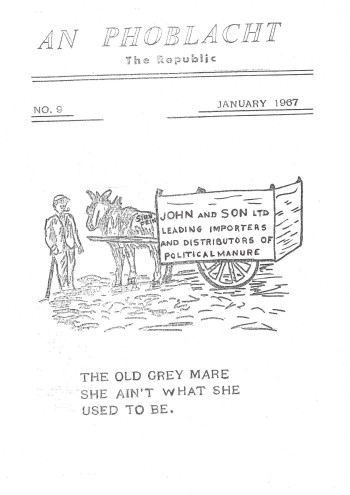
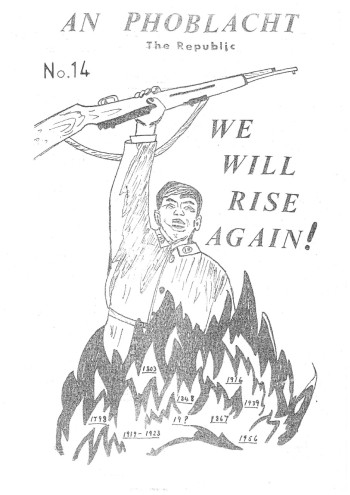
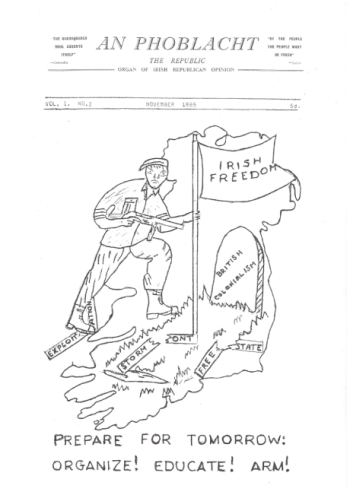
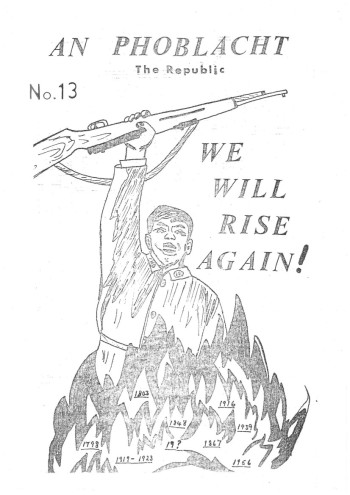
Comments
You can also join the discussion on The Cedar Lounge Revolution
No Comments yet.
Add a Comment
Comments can be formatted in Markdown format . Use the toolbar to apply the correct syntax to your comment. The basic formats are:
**Bold text**
Bold text
_Italic text_
Italic text
[A link](http://www.example.com)
A link